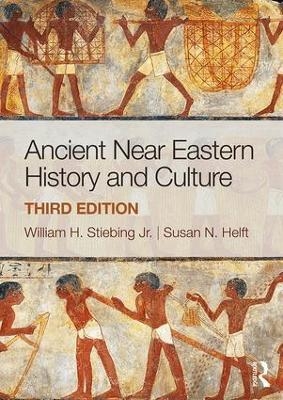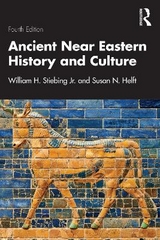
Ancient Near Eastern History and Culture
Routledge (Verlag)
978-1-138-68641-0 (ISBN)
- Titel erscheint in neuer Auflage
- Artikel merken
Organized by the periods, kingdoms, and empires generally used in ancient Near Eastern political history, Ancient Near Eastern History and Culture interlaces social and cultural history with a political narrative. Charts, figures, maps, and historical documents introduce the reader to the material world of the ancient Near East, including Egypt. The emphasis on historical debates and areas of uncertainty helps students understand how historians use evidence to create interpretations and that several different interpretations of history are possible.
New features in this edition include:
Reorganization of the chapters on the early periods, with discussions incorporating the latest archaeological finds.
New "Debating the Evidence" sections discussing current controversial issues in Near Eastern history. These sections make it easy for students and teachers to find and use the portions of the text devoted to scholarly arguments about various aspects of ancient Near Eastern history.
A new chapter, "Ancient Israel and Judah," has been added to cover more completely the crucial issues of ancient Israelite history and religion.
More emphasis has been placed on the role and contributions of women in the ancient Near East.
The most important change is the addition of co-author Susan N. Helft, a specialist in the art and archaeology of the ancient Near East, who has applied her considerable knowledge, insight, research, and editing skills throughout the book. This new edition of Ancient Near Eastern History and Culture will remain a crucial text for students beginning to learn about the fascinating civilizations of the Near East.
William H. Stiebing Jr. is Seraphia Leyda Professor of History, Emeritus, at the University of New Orleans, USA. Susan N. Helft is an adjunct lecturer at Rutgers University Newark and Bryn Mawr College, USA.
Introduction: Studying the Ancient Near East
A Note on Chronological Terminology
What Is the "Near East"?
Near Eastern Geography and Environment
Antiquity’s "Clues"
Creating a Chronology for the Ancient Near East
Chapter 1: Near Eastern Prehistory
Southwest Asia in the Late Paleolithic, Neolithic and Chalcolithic Periods
The Nile Valley in Late Prehistory
Major Changes in Lifestyle during the Neolithic and Chalcolithic Periods
Chapter 2: The Dawn of Civilization in Western Asia
The Emergence of Mesopotamian and Iranian Civilization (c. 4000-3000 BCE)
The Mesopotamian Early Dynastic Period (c. 2900–2330 BCE)
Mesopotamian Culture during the Early Dynastic Era
Chapter 3: The First Mesopotamian Empires
The Akkadian Empire (c. 2334-2193 BCE)
The Third Dynasty of Ur (c. 2112-2004 BCE)
Chapter 4: The Development of Civilization in the Wider Near East
Early Urbanization in the Levant and Anatolia
Persian Gulf and Central Asian Civilizations
Chapter 5: Egypt to the End of the Old Kingdom
Prelude to Civilization
The Formation of the Egyptian State (c. 3050-2593 BCE)
Some Basic Elements of Egyptian Belief
The Old Kingdom (Dynasties 3-6, c. 2592-2150 BCE)
Society and Culture
Chapter 6: The Old Babylonian Period and Its Aftermath
The "Interregnum" After the Fall of Ur (c. 2000-1800 BCE)
The Era of Hammurabi and His Dynasty (c. 1800-1595 BCE)
Old Babylonian Cultural Developments
The Hittite Old Kingdom
The Emergence of Other New Peoples
Chapter 7: The Rise and Fall of the Egyptian Middle Kingdom
The First Intermediate Period: Dynasties 8- Early 11 (c. 2180-1980 BCE)
The Middle Kingdom: Dynasties Late 11-Early 13 (c. 1980-1725 BCE)
The Second Intermediate Period: Dynasties Late 13-17 (c. 1725-1540 BCE)
Chapter 8: Egypt’s Powerful Eighteenth Dynasty
The Beginning of the Egyptian New Kingdom (c. 1539-1480 BCE)
Hatshepsut and Thutmose III (c. 1479-1425 BCE)
The Egyptian Empire at Its Height (c. 1425-1350 BCE)
Akhenaton and the Amarna Period (c. 1353-1336)
The End of the Eighteenth Dynasty (c. 1335-1292 BCE)
Chapter 9: The End of the Bronze Age
The Zenith of Hittite Power (c. 1344-1180 BCE)
Hittite Culture
The Twilight of the Egyptian Empire (c. 1292-1150 BCE)
The Collapse of Bronze Age Societies in the Eastern Mediterranean
Chapter 10: Recovery and Transformation (c. 1100-745 BCE)
Mesopotamia and Egypt
Anatolia
Syria
Small States of the Southern Levant
Chapter 11: Mesopotamian Supremacy
Assyrian Domination
Neo-Assyrian Society and Culture
The Neo-Babylonian (or Chaldean) Empire (627-560 BCE)
Neo-Babylonian Culture
Chapter 12: The Achaemenid Persian Empire
The Origins and Growth of the Persian Empire
The Achaemenid Empire at Its Height
Persian Culture
The Latter Part of the Achaemenid Persian Empire
Epilogue: The Near East after the Achaemenid Empire
Chapter 13: Ancient Israel and Judah
Early Israel
The Kingdoms of Israel and Judah (c. 931-721 BCE
The Emergence of Biblical Monotheism
Post-Exilic Judah
Afterword: The Legacy of the Ancient Near East
Glossary
Index
| Erscheinungsdatum | 04.10.2017 |
|---|---|
| Zusatzinfo | 13 Tables, black and white |
| Verlagsort | London |
| Sprache | englisch |
| Maße | 174 x 246 mm |
| Gewicht | 950 g |
| Themenwelt | Geschichte ► Allgemeine Geschichte ► Altertum / Antike |
| ISBN-10 | 1-138-68641-7 / 1138686417 |
| ISBN-13 | 978-1-138-68641-0 / 9781138686410 |
| Zustand | Neuware |
| Informationen gemäß Produktsicherheitsverordnung (GPSR) | |
| Haben Sie eine Frage zum Produkt? |
aus dem Bereich



